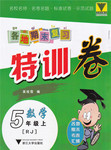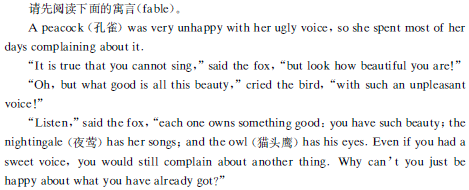题目内容
5.Face the problem bravely and you ______ a new way to success.( )| A. | find | B. | found | C. | will find | D. | have found |
分析 勇敢地面对困难,你就会找到一个新的成功的方法.
解答 答案:C 考查一般将来时."祈使句+and+陈述句"句型结构中,前一分句表示一种条件或假设,相当于if条件状语从句,后一分句表示一种结果或推论.陈述句中多用一般将来时态.故选C.A项:一般现在时;B项:一般过去时;D项:现在完成时.
点评 解答此类问题要了解各种时态的基本含义,并区别各种时态之间的差异,了解某些时态的特殊用法,然后结合语境选择正确答案.

练习册系列答案
 各地期末复习特训卷系列答案
各地期末复习特训卷系列答案 小博士期末闯关100分系列答案
小博士期末闯关100分系列答案
相关题目
10.At the airport,I looked closely at the face of my son,Daniel,his backpack by his side.We were saying good-bye.In a few hours he would be flying to France to(41)Da different life.It was a transitional(过渡期的)time in Daniel's life.I wanted to leave him some(42)Cwords.However,nothing came from my(43)Band this was not the first time I had let such a moment(44)CPast memories came(45)Don me.
When Daniel was five,I took him to the school-bus stop on his first day of kindergarten.He(46)Bme-as he did now."What is it going to be like,Dad?Will I be okay?"And then he walked up the(47)Aof the bus and disappeared inside.And the bus drove away.And I had said nothing.
A decade or so later,a similar(48)Dappeared.I drove him to college.I tried to think of something to say to give him(49)Cand confidence as he started this new life.Again,words(50)Ame.
Now,as I stood before him,I thought of Daniel's grandfather and those(51)Aopportunities in my life.How many times have we all let such moments pass?
My father and I loved each other.Yet,I always(52)Bnever hearing him put his(53)Binto words and never having the memory of that moment.Now,I could feel my hands sweat and my throat tighten.Why is it so(54)Cto tell a son something from the heart?
My mouth turned dry,and I knew I would be able to speak out only a few words(55)C."Daniel,"I said,"if I could have picked,I would have picked you."That's all I could say.I wasn't sure he understood what I(56)D.Then he came toward me and threw his arms around me.For a moment,the world and all its people stopped,and there was just Daniel and me.He was saying something,(57)Amy tears rolled down,and I couldn't understand what he was saying.All I could(58)Bwas the stubble(胡茬)on his chin as his face(59)Cagainst mine.And then,the moment ended.What I had said to Daniel was clumsy.It was nothing.And yet,it was(60)A
When Daniel was five,I took him to the school-bus stop on his first day of kindergarten.He(46)Bme-as he did now."What is it going to be like,Dad?Will I be okay?"And then he walked up the(47)Aof the bus and disappeared inside.And the bus drove away.And I had said nothing.
A decade or so later,a similar(48)Dappeared.I drove him to college.I tried to think of something to say to give him(49)Cand confidence as he started this new life.Again,words(50)Ame.
Now,as I stood before him,I thought of Daniel's grandfather and those(51)Aopportunities in my life.How many times have we all let such moments pass?
My father and I loved each other.Yet,I always(52)Bnever hearing him put his(53)Binto words and never having the memory of that moment.Now,I could feel my hands sweat and my throat tighten.Why is it so(54)Cto tell a son something from the heart?
My mouth turned dry,and I knew I would be able to speak out only a few words(55)C."Daniel,"I said,"if I could have picked,I would have picked you."That's all I could say.I wasn't sure he understood what I(56)D.Then he came toward me and threw his arms around me.For a moment,the world and all its people stopped,and there was just Daniel and me.He was saying something,(57)Amy tears rolled down,and I couldn't understand what he was saying.All I could(58)Bwas the stubble(胡茬)on his chin as his face(59)Cagainst mine.And then,the moment ended.What I had said to Daniel was clumsy.It was nothing.And yet,it was(60)A
| 41.A.spend | B.represent | C.entertain | D.start |
| 42.A.amusing | B.astonishing | C.meaningful | D.convincing |
| 43.A.head | B.lips | C.thoughts | D.mind |
| 44.A.fly | B.remain | C.pass | D.deliver |
| 45.A.cutting down | B.playing jokes | C.looking down | D.crowding in |
| 46.A.looked at | B.stared at | C.glanced at | D.glared at |
| 47.A.steps | B.chairs | C.handles | D.windows |
| 48.A.sign | B.sight | C.scenery | D.scene |
| 49.A.consideration | B.admission | C.inspiration | D.influence |
| 50.A.failed | B.occurred | C.struck | D.hit |
| 51.A.valuable | B.impressive | C.lost | D.embarrassing |
| 52.A.wondered | B.regretted | C.tried | D.minded |
| 53.A.judgements | B.feelings | C.actions | D.comments |
| 54.A.considerate | B.frightening | C.hard | D.unbelievable |
| 55.A.slightly | B.obviously | C.clearly | D.carefully |
| 56.A.counted | B.cared | C.valued | D.meant |
| 57.A.but | B.and | C.because | D.so |
| 58.A.observed | B.sensed | C.struggled | D.focused |
| 59.A.gestured | B.whispered | C.pressed | D.held |
| 60.A.everything | B.all | C.none | D.anything |
17.As many as 20dishes are provided in the dining hall today,choose _ suits you best.( )
| A. | whatever | B. | whenever | C. | whichever | D. | wherever |
